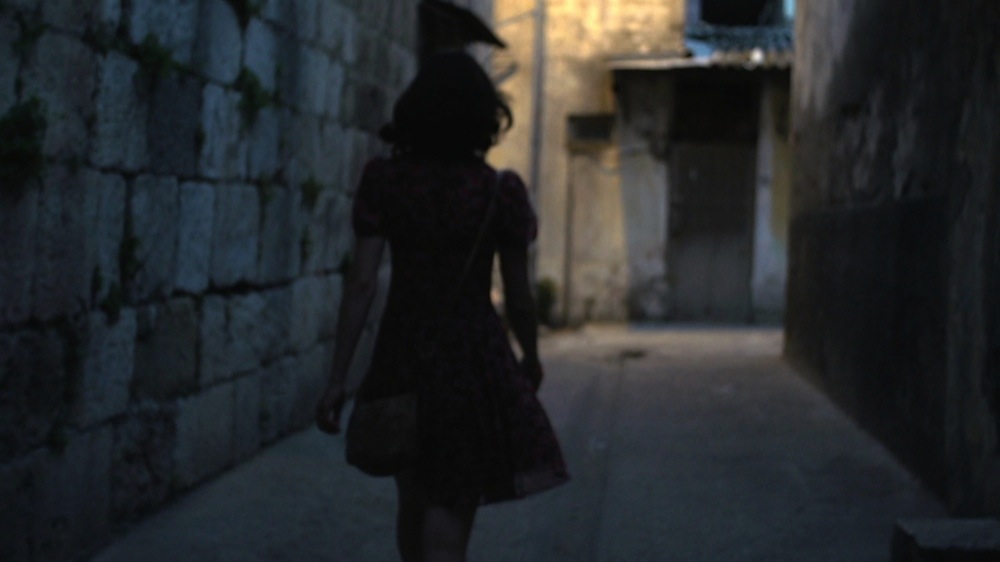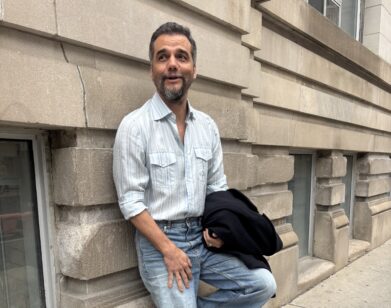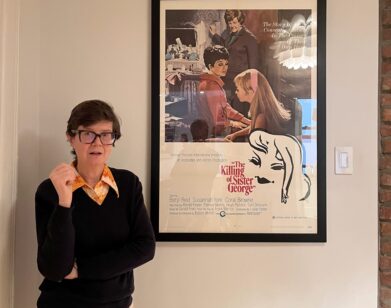Searching for a Gay Girl in Damascus

ABOVE: STILL FROM A GAY GIRL IN DAMASCUS: THE AMINA PROFILE
“There are a lot of catfish in the sea” is not quite how the adage goes, but it holds true for today’s hyper-connected age of Internet. It’s also the theme that ties together filmmaker Sophie Deraspe’s first feature-length documentary, The Amina Profile, which follows a Montreal woman named Sandra Bagaria looking for answers about her online relationship in the throes of the Arab Spring. On the eve of the Syrian revolution, Bagaria began a relationship with a woman named Amina, an aspiring novelist and blogger at A Gay Girl in Damascus. When the political situation escalated in the spring of 2011, Amina was reportedly kidnapped by the Syrian government, which launched a campaign to free her from likely torture and abuse.
But as it turned out, Amina was perhaps not just as she had conveyed herself (and here, those unfamiliar with the story may want to turn back to avoid spoilers). As NPR finally unveiled, she was in fact a he: Tom McMaster, of Edinburgh, an aspiring writer himself who says he launched this deception as a way of bringing more attention to the injustices in Syria. Why he began a relationship with Bagaria, though, remains a bit hazier, and this is where Deraspe’s documentary picks up its momentum. She and Bagaria chase the loose ends of Amina Arraf’s disappearances across the globe from San Francisco to Istanbul.
Bagaria signed on to the documentary to gain closure. “I never wanted to be the victim,” she says, so she passed all of the documentation of her relationship over to Deraspe, a close friend, to see if a story could be made of the material. And though it’s titled The Amina Profile, the film really focuses on Bagaria’s search for answers in the wake of a long con. As evidenced in the film, though, she was not the only one deceived by the blog and its mastermind. The Amina Profile convenes a whole host of bloggers, activists, Syrian revolutionaries and purported friends of Amina to explore the nature of online relationships, the role the Internet plays in connecting individuals, and the way we tell and relate to stories. The resulting narrative weaves together the stories of those who orbited Amina with artful interludes (the only appearance of an actress in the film). It underscores the close link between creative production and reality that defines contemporary storytelling.
The stars of The Amina Profile were certainly not the first to confront Internet-propagated deception, nor were they the last. Last year, a group of Norwegian filmmakers posted a staged video of a young boy playing dead in order to save a girl from snipers in Syria. The video was picked up by the New York Post and portrayed as a heroic act caught on camera. But its director later posted a statement that the video had been intended to spark discussion about children growing up in war zones and to gauge the media response. In Bagaria’s recent conversation with Interview, she cites this as just one among many proofs that we’ve perhaps bitten off more than we can chew in the pursuit of fast-paced, exciting, relatable narratives.
KATHERINE CUSUMANO: How did you get involved in making a documentary about your experience with Amina?
SANDRA BAGARIA: It was not in my first intention that I would do it, but I realized as the story revealed itself that it was a really heavy story for me to keep for myself. It was never a simple, sweet story. So I went to my friend Sophie, and she was like, “Yeah, I think there’s something to do with that story.” At the beginning, she didn’t really know what form it would be like. It was a really tricky thing for her because it was all my story, so what would she shoot? As soon as I actually shared it with her, I felt that my personal process could begin—to not be the only one to know about it. I have to say that when I, in a way, handed it to her, I was like, “Okay, now it’s just going to be opening Pandora’s box and I have to accept.” I was very cautious of that process.
CUSUMANO: Why do you think that Amina and her blog appealed to so many people? What allowed Tom McMaster to get away with this kind of deception for so long and to mislead so many people?
BAGARIA: It is a mirror of how we now understand news and connect to stories around us. As humans, we need appealing stories if we want to emotionally get invested. For me, it was a lesson of how we, with technology and social media, get connected to outside worlds and other cultures. He pushed the buttons of trying to reflect our understanding of the Middle East and orientalism, of how we get involved in stories and how we get moved by stories. This is what I’ve been experiencing for the last three years now—making sure that I’m not getting hooked on stories only by titles, and only by words and buzzwords. It’s hard because this is the way we’ve been experiencing news or even entertainment for the last decade. We don’t go deeper. We’re lacking time, and we don’t allow ourselves to go in depth. This is what I think is really disturbing. It was the perfect timing—we probably wanted to hear about it, and we just got the perfect story for it.
CUSUMANO: It ties all of these people together across such a broad space.
BAGARIA: Yeah, exactly, and out of a conflict—out of death in Syria. We just moved on and it’s still being acted. It’s still happening.
CUSUMANO: How do you think that social media has changed the way that people interact across space?
BAGARIA: It’s very interesting, now big media outlets double-check on social media. It’s the other way around. Before, we were taking everything for granted, and now, the more you talk about it on social media we think it’s probably true. We’ve got to be sure to report this story. We’ve been really pushed into social media before we were prepared for the impacts of it. It’s hard not to make any mistakes, and social media helps and still helps activists to connect—even more the LGBT community, it’s hard to be isolated. Even if you’re in conflict countries, where you’re under revolution or under repressive regimes, it helps a lot of people to know what’s going on, but you still need to be cautious of how you understand it and how you read it. I think this is where The Guardian had a very, very big impact, saying that they met Amina when it was actually not a face-to-face meeting. We’re not using the words properly and just jumping to a conclusion very easily.
CUSUMANO: Speaking of the way that news outlets contributed to this, the documentary form is a kind of re-reporting of something that happened. So what do you think that retelling this story adds to it? What does it add to the narrative that happened in 2011?
BAGARIA: I think it could still happen. I think we didn’t learn that much, and we’re so pushed and driven by performance and by being the first one to tell a story or having that breaking news. Now, news networks are only working about breaking news, and the first thing you watch is breaking news. If you want to get people’s attention, that’s the title you put on your news. And I think this is exactly where it’s wrong—we should make more investigations instead of having more Facebook statuses or breaking news-oriented or buzz-oriented journalism. This is where it’s very difficult to know when to stop believing in your stories. I think it’s very important to be sure before we share, or comment on something. I want to be sure I understand all of it and I want to be sure I’m not sharing something that is wrong or false. It’s a really good lesson for a lot of us that sometimes you just move on and you forget very easily.
CUSUMANO: That makes sense, especially with things like Twitter, where you’re pressured to express something in 140 characters.
BAGARIA: Re-tweeting is also so easily done. If you’re re-tweeting, doesn’t mean you believe in it, doesn’t mean it’s true or wrong. It’s easy—I love that we can give out opinions. That is great. But sometimes, just be aware.
CUSUMANO: A few of the bloggers in the documentary mentioned that they thought the whole revelation that Amina was not real really distracted from the cause in Syria. Do you think there was any upside to what Tom McMaster did? Or do you think it was negative?
BAGARIA: I think it was. A lot of people put their life at risk. It’s not easy to be gay in Middle East or fighting the regime. That was highly threatening to them and to their families. They tried to stay with Amina and put themselves in front and expose a lot for someone that never existed. Then the regime took that story as westerners’ propaganda just to blame the regime for a revolution. It really was hurtful and harmful for the revolution and for the activism that they were trying to do there. And that really hurt the community online. Because of that story, a lot of people that were real and that had connections to the media were doubted, and I think it was really hard to get back to having trustable connections and sources.
CUSUMANO: What, for you, was the biggest challenge of making the film?
BAGARIA: You’re behind the scenes for three years, and then you have that amazing moment where you get selected to Sundance. I freaked out. When we went, I was excited, and on the other side I was scared: “It’s going to be a lot of media, and I’ll have to answer a lot of questions, so am I ready to do that?” This is where you surprise yourself because time really, truly works as a vaccine, and you don’t really realize it until you are in action. When we started sharing [the film] with people and audiences at Sundance, having the feedback, and knowing that now the project has its own path feels good. It really healed me.
A GAY GIRL IN DAMASCUS: THE AMINA PROFILE IS OUT IN SELECT THEATERS TOMORROW, JULY 24, AND TO STREAM VIA SUNDANCENOW DOC CLUB.






